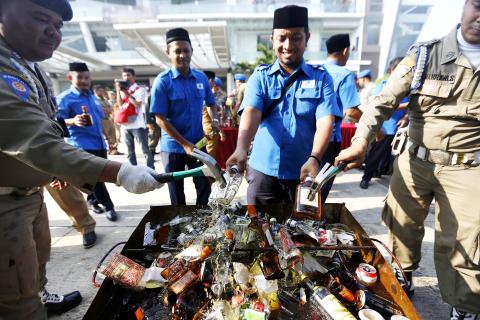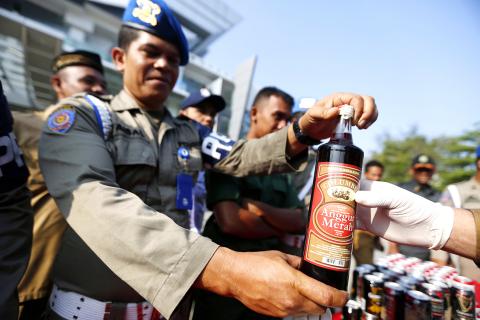IB Agung Partha foresees an apocalypse, as he put it, on the Indonesian resort island of Bali.
The threat is not a plague of locusts, nor one of Bali’s dormant volcanos springing to life. It is in Jakarta, the Indonesian capital several hundred miles away, where Parliament is debating legislation that would ban beer, wine and spirits across the thousands of islands that make up this country.
For Bali, whose beaches, lush landscapes and cultural attractions drew 4 million visitors last year, the effect would be something like the end of the world, said Partha, chairman of the Bali Tourism Board.

Photo: EPA
“Hotels have bars, restaurants have bars, and they serve alcohol — this is just part of tourism,” he said. “This bill is just no good.”
Alcohol bans have been proposed before in Indonesia, by the same Islamic political parties that are pushing the current bill. Their scripture-based arguments gained little traction in Indonesia’s multifaith society, which is mostly Muslim but has a secular government.
But this time, those parties have taken a new line: that alcohol should be banned for health reasons, not religious reasons. And a passive response to the legislation by Indonesia’s dominant secular parties, which could have quashed it months ago, has some worried that it could become law.

Photo: EPA
“For me, it’s all about pluralism and human rights,” said Rudolf Dethu, a leader of two groups opposing the legislation, one of which organizes social events to promote the culinary aspects of beer.
“It’s not just about alcohol — there’s something bigger behind this,” Dethu said. “First it’s drinking, and then rules on who you can date and what time you can go out at night, and it’s not in the Indonesian culture to say no to authority.”
ALTERIOR MOTIVES
There have long been fears about creeping Islamization in Indonesia, which is the world’s most-populous Muslim-majority nation but has influential Christian, Hindu and Buddhist minorities. (The vast majority of Bali’s residents are Hindu.)
Political Islam has made gains here since Indonesia began moving toward democracy in 1998, after the ouster of its long-ruling authoritarian president, Suharto. In the past decade, autonomous regional governments have passed hundreds of local bylaws inspired by Islamic law, many of which enforce morality codes. The country’s Constitutional Court is hearing a petition by an Islamist group demanding that gay sex be outlawed, and that an existing adultery law be expanded to include sex between unmarried persons.
The bill before Parliament would ban the production, distribution, sale, consumption and possession of alcoholic beverages among Indonesians and foreign tourists alike. Violators could face up to 10 years in prison.
Critics of the Islamic parties backing the bill — which have the support of hard-line Muslim groups that have sometimes engaged in violent intimidation — say their concern for drinkers’ health is a cover for pushing Indonesia toward becoming an Islamic state under Shariah law.
Mohammad Arwani Thomafi, a lawmaker from the Islam-based United Development Party and chairman of a special legislative committee debating the bill, said his party was merely acting out of concern for public health.
“Prohibition should be a legal requirement to protect the public,” he said, citing “dozens” of deaths across Indonesia each year directly linked to drinking.
TANGIBLE CONNECTION TO ALCOHOL
But while that statistic is accurate, none of those deaths were connected with alcohol sold legally in stores, bars and restaurants — mostly to relatively affluent Indonesians and to foreigners. Rather, they were caused by illegally brewed spirits, an underground industry involving hundreds or perhaps thousands of producers, to which the Indonesian police have largely turned a blind eye.
The Center for Indonesian Policy Studies in Jakarta, citing local media reports, said there had been 453 deaths and 373 injuries from drinking alcohol since 2012. All were from illegally distilled alcohol, locally known as “oplosan,” which can contain a variety of substances including methanol, medicinal alcohol, fruit extract and toxic substances such as mosquito repellent.
And 83 percent of those deaths occurred in autonomous districts with Shariah-inspired bans or restrictions on the sale of alcohol, said the center’s executive director, Rainer Heufers.
Such regulations “do not increase public morality and health,” Heufers said. “Instead, they push the consumption from legally produced and traded alcohol to illegally produced and traded alcohol, which leads to more deaths and injuries.”
President Joko Widodo’s governing coalition, which plays a key role in drafting legislation and holds a majority in Parliament, is against the ban. His government has proposed increased regulation instead, including mandatory licensing for stores that sell alcohol and identification checks for buyers.
NOT A HEALTH CRISIS
Alcohol has been consumed in Indonesia for centuries, and it is an integral part of cultural and religious ceremonies among some of the country’s more than 300 ethnic groups. A survey of 1,600 people in eight Indonesian cities, conducted by another Jakarta-based research institute, the Center for Strategic and International Studies, found that most respondents did not regard drinking as a health crisis.
“The Indonesian public does not consider this alcohol issue an urgent matter, but some of our politicians do,” said David Christian, a researcher with the group.
Christian said that study only looked at the national economy, not at the presumably more severe effects a ban would have on places like Bali or Jakarta, which has hundreds of upscale hotels, restaurants, wine bars and pubs.
Prohibition would also trigger the implosion of the US$600 million local alcoholic beverages industry, shutting down Indonesian companies that produce spirits, beer and cider (and closing three wineries in Bali). The largest of these companies is Multi Bintang Indonesia, which brews Bintang, the national beer, and is also the local brewer of Heineken and Guinness.
The company — which opened in 1931, when Indonesia was under Dutch rule — operates the first Heineken brewery opened outside of the Netherlands, had net sales of US$220 million last year, and has a market capitalization of more than $1 billion. The company also invested $50 million during the past two years to upgrade and expand its operations, all of which could be lost, said Michael Chin, the company’s president director.
“Obviously I am concerned, but it does not stop us from engaging the government and Parliament on a regular basis” about the proposed ban, Chin said. “There is no health crisis that is related to legitimate alcohol.”
Warning: Excessive consumption of alcohol can damage your health.

Jan. 26 to Feb. 1 Nearly 90 years after it was last recorded, the Basay language was taught in a classroom for the first time in September last year. Over the following three months, students learned its sounds along with the customs and folktales of the Ketagalan people, who once spoke it across northern Taiwan. Although each Ketagalan settlement had its own language, Basay functioned as a common trade language. By the late 19th century, it had largely fallen out of daily use as speakers shifted to Hoklo (commonly known as Taiwanese), surviving only in fragments remembered by the elderly. In

William Liu (劉家君) moved to Kaohsiung from Nantou to live with his boyfriend Reg Hong (洪嘉佑). “In Nantou, people do not support gay rights at all and never even talk about it. Living here made me optimistic and made me realize how much I can express myself,” Liu tells the Taipei Times. Hong and his friend Cony Hsieh (謝昀希) are both active in several LGBT groups and organizations in Kaohsiung. They were among the people behind the city’s 16th Pride event in November last year, which gathered over 35,000 people. Along with others, they clearly see Kaohsiung as the nexus of LGBT rights.

Dissident artist Ai Weiwei’s (艾未未) famous return to the People’s Republic of China (PRC) has been overshadowed by the astonishing news of the latest arrests of senior military figures for “corruption,” but it is an interesting piece of news in its own right, though more for what Ai does not understand than for what he does. Ai simply lacks the reflective understanding that the loneliness and isolation he imagines are “European” are simply the joys of life as an expat. That goes both ways: “I love Taiwan!” say many still wet-behind-the-ears expats here, not realizing what they love is being an

In the American west, “it is said, water flows upwards towards money,” wrote Marc Reisner in one of the most compelling books on public policy ever written, Cadillac Desert. As Americans failed to overcome the West’s water scarcity with hard work and private capital, the Federal government came to the rescue. As Reisner describes: “the American West quietly became the first and most durable example of the modern welfare state.” In Taiwan, the money toward which water flows upwards is the high tech industry, particularly the chip powerhouse Taiwan Semiconductor Manufacturing Co (TSMC, 台積電). Typically articles on TSMC’s water demand